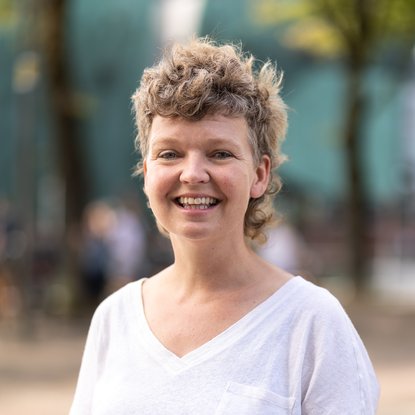Last Wednesday, October 18, we celebrated the graduation of our MSc MADE Students. During their time at AMS Institute, they dedicated themselves to several different projects regarding urban challenges. Projects like the creation of documentaries, learning how to use the Living Lab methodology and working together with case owners like Energie Lab Southeast, SPATwater and many others. The final challenge for our MSc MADE students dedicate their time and effort to at AMS Institute, is their theses. Today, we highlight some of the theses presented by our MSc MADE students, that were featured on the frontpage of openresearch.amsterdam.
Solving the housing crisis
MSc MADE graduate Marie Geeraedts wrote the thesis Who are they? What do they want? And why do they want it? In it, she analysis the Woonprotest of 2021, a protest against the housing crisis in the Netherlands. After gathering information in literature about the history of the existing housing crisis, Marie analyzed pictures of the protest to determine the different types of protest attendees. Utilizing Instagram, her personal network and national and political organizations, she contacted several protest attendees to interview them about their motives for protesting, and their desired outcome. She determined that protesters have three different ideologies when they think about the housing crisis. These ideologies are communism, anarchism, and solving the crisis within the current system. Despite these differences, they are united in their conviction that rents need to be regulated differently and that vacancy should be tackled. This research is a contribution to the understanding of the housing crisis and how ideologies influence civilian perspectives.
How walkable is Amsterdam?
A city that is easy to walk in has healthier inhabitants. The degree in which an environment encourages visitors to walk is called “walkability”. In his thesis Amsterdam on foot, Matias Cardoso doesn’t try to define indicators for walkability itself. He tries to determine the perception of inhabitants of Amsterdam. What specific city characteristics influence the thoughts of Amsterdammers on walkability? To find out, Matias used a mixed methods approach, including a literature review, interviews, and a geospatial analysis. In the interviews, he determined why inhabitants of Amsterdam walk certain streets. With a geospatial analysis, using publicly available sources such as OpenStreetMap, the Dutch BGT (Basisregistratie Grootschalige Topografie) or the Open Data Portal from the municipality of Amsterdam, the factors derived from the interviews were measured in the city. The result of this research is a walkability index specifically for Amsterdam.
More than explaining the algorithm
XAI, or explainable AI, is the implementation of AI while informing humans about the reasoning behind its decisions. In the study Elucidating a ‘black box’ transcends explaining the alogrithm, MSc MADE graduate Rajiv Abhiramini researches the use of AI in public decision making in the Netherlands, and the possible role of XAI in this. In the thesis, she looks at the challenges managers, data scientists and domain experts face when implementing an AI system. She also explores and highlights the importance of using XAI for different purposes and looking at it from different perspectives, as different actors can benefit from different explanations. The findings from the study encourage to go beyond a one-size-fits-all approach and to explore non-traditional XAI solutions.
Green policies
Microbes are organisms with one cell or multiple cells that we are unable to see. Although some microbes make us sick, many microbes are important for our health, like the gut microbiome. We now live in a time of decline in microbial diversity, which negatively impacts our health. MSc MADE graduate Lune Walder researched ways to encourage microbiological diversity, using existing green policies of the City of Amsterdam. With the Policy Arrangement Approach, she studied the current relation between green policies and microbial-inclusive practices. She analyzed the actors, resources, rules of the game, and discourse. The finding: microbial-inclusive practices are currently absent in Amsterdam. To improve this situation, Lune provides methods to systematically integrate microbial inclusive practices, alongside recommendations for further research.
Read more
Of course, there are many more interesting theses written by MSc MADE students. Want to read more? Go to this page.
